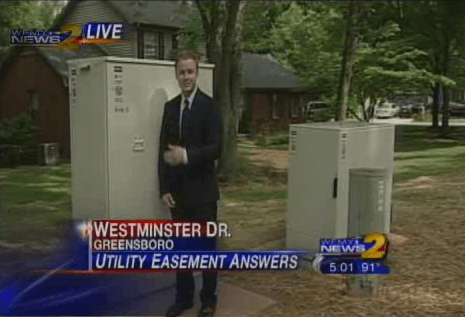Several years ago, phone companies like AT&T and Verizon discovered providing competing cable service over U-verse and FiOS meant approaching each community, asking permission to tear up the streets and yards of local residents to deliver the service. AT&T’s U-verse requires enormous 4-6 foot ugly metal cabinets in the front or side yard of a customer every few blocks. Verizon’s FiOS network necessitates the replacement of the copper wire network with fiber optic cables in its place. More than a few yards and streets were torn up installing the new cables.
Dealing with individual town boards, city councils, and other franchising authorities became a nuisance for the companies, so both decided to invest some serious lobbying money to rip control away from local authorities. Understanding they would never get away with advocating for no oversight, they settled for the next best thing — advocating for a statewide franchise law. With that, both phone companies simply needed to obtain a single license from the state to operate.

U-verse cabinets often make the evening news when they are plunked down in your front yard. With statewide video franchise laws, you and your local community leaders no longer have a say.
AT&T has been especially successful in passing such “reforms” in their service areas. Verizon has fought less successfully in the more-skeptical northeastern states unwilling to give the company carte blanche-benefit of the doubt.
Illinois is definitely AT&T territory, and the company’s successful push for statewide franchising in 2007 was tied to promises AT&T would hurry out its U-verse service across Illinois. Instead, with many Illinois customers still without access to U-verse, the phone company recently announced its upgrade-expansion was over. But AT&T remains grateful to the Illinois legislature for keeping its end of the agreement — removing certain pesky consumer protection and local oversight laws.
AT&T also craftily defined limits on how much authority the state franchise body could have to operate. In some states, franchise authorities are little more than paper pushers issuing franchise agreements at-will to operators, leaving local communities stuck with whatever quality of service the phone and cable company is willing to offer.
While phone companies spent millions lobbying for franchise reform, the cable industry has occasionally fought their efforts, maintaining AT&T and Verizon should have to follow the same rules they do. Cable operators spent years negotiating franchise agreements with every community they service. In many cases, the cable industry lost the battle but, along with AT&T and Verizon, effectively won the war.
In Carbondale, cable customers quickly learned that statewide video franchise “reform” pushed by AT&T was no help to them. Soon after the law was passed, Mediacom closed the only local customer service center in the city, in direct violation of their local 2009 franchise agreement that required Mediacom to keep its service center open for at least a decade after signing.
In court, Mediacom argued their signed contract with Carbondale was null and void because of the changes to the Illinois Public Utility Act, which transferred franchise authority to the Illinois state government and out of the hands of local officials.
Carbondale officials sued Mediacom in 2010 over the franchise violation, and the cable company opened a temporary customer service center in a local shopping center as an interim measure.
Now two courts have found in favor of Carbondale’s carefully written franchise agreement, and have ruled Mediacom cannot simply tear up their local franchise agreement, state law or not.
What made the difference for Carbondale was language in the agreement that kept close to the consumer protection provisions now found in the statewide franchise law. Courts found that because Carbondale did not stray from the state’s standards, they were within their rights to expect Mediacom to continue operating under the terms of the franchise agreement the company signed.
 “The circuit court correctly concluded that the plaintiffs and Mediacom ‘mutually agreed to contracts, both valid at the time of their formation, and valid after the enactment of the customer service and privacy protection standards of (statute),” Justice James M. Wexstten wrote in the appellate ruling.
“The circuit court correctly concluded that the plaintiffs and Mediacom ‘mutually agreed to contracts, both valid at the time of their formation, and valid after the enactment of the customer service and privacy protection standards of (statute),” Justice James M. Wexstten wrote in the appellate ruling.
That leaves Mediacom mulling extending its lease on their single local customer service center, at least until they decide whether or not to appeal the case to the Illinois Supreme Court.
Jackson County Assistant State’s Attorney Dan Brenner and Carbondale City Attorney Mike Kimmel, who fought Carbondale’s case in court told The Southern they would not be surprised to see Mediacom pursue the case.
“As far as we’re all concerned, they’ve got to keep that service center open in Carbondale until the contract ends or they get this thing reversed,” Brenner told the newspaper.


 Subscribe
Subscribe